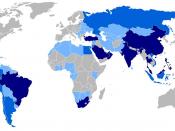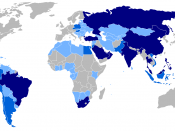The free trade debate has been a long and very much politicized one since its conception, with people split up into camps such as "Economic Liberalists" and "Neo-Mercantilists". Whether or not to impose a free trade system between countries has caused much fear and confusion within the public. Will free trade be beneficial to all or will it cause unemployment in developed countries? Will it cause entire domestic industries to crumble under the pressure of cheaper foreign products or will it lead to more productive domestic markets and new jobs in booming export industries? Will it lead to a so called 'race to the bottom' in which countries compete for the most lax environmental standards and low wages so as to attract investment, or will it increase workers rights and wages in developing countries and encourage better environmental standards for all countries? These are just some of the issues looming the free trade debate.
Economic Liberalists argue that free trade would be beneficial to all countries if each country exports goods that it has the comparative advantage in producing, and imports products that they do not specialize in producing. Thus maximizing profits in they're own specialized exports and obtaining other goods cheaply from other countries. However, as Clive Hamilton observes (2002:61) the comparative advantage theory makes many assumptions that do not hold in reality. Assumptions such as the non-existence of unemployment, perfect competition and the overlooking of implicit cost such as pollution and damage to the natural word make this theory in applicable in the real world. Even so this theory remains the basis for pushing free trade in the global market.
Hamilton also stipulates that producing just what appears to be a country's "comparative advantage" is not always the route to the highest profits. For example, in the 1950s...


